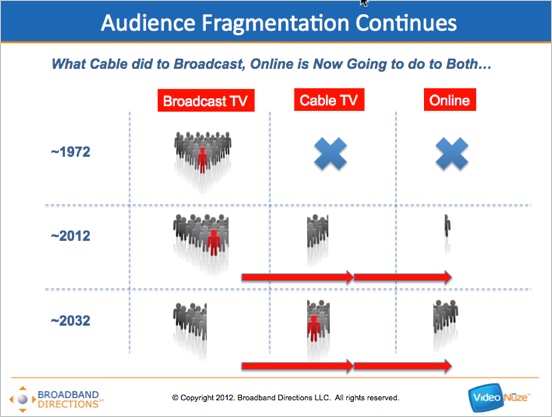-
Digital Content NewFronts Point to Audience Fragmentation Ahead
As with TV, it's awfully hard to predict which particular programs and initiatives unveiled at last week's Digital Content NewFronts ("DCNF") will succeed and which will flop. But one thing that I'm fairly certain of is that the aggregate effort by digital outlets to create high-quality originals portends significant audience fragmentation ahead. To me, the historical parallel is as follows: what cable TV has done to broadcast TV in re-distributing audiences, online is about to do to cable TV and to broadcast.
In fact, one of the things that is most noteworthy about last week's DCNF is how many TV and film veterans are now involved in online originals. What people like Katie Couric, Tom Hanks, Anthony Zuiker, Jeff Goldblum and others all have in common is that they know how to create content that appeals to targeted audiences. While the online video platform offers their programs enhanced distribution, targetability and interactivity, at the end of the day, it's their storytelling skills that attract eyeballs.
And that's the main reason why I'm bullish on what's happening with online originals and believe that fragmentation is ahead. At the end of the day, when compelling stories are told and they can be found and comfortably enjoyed by people in the environment of their choice (whether big screen, tablet, smartphone, etc.), viewership will result. TV pioneers in broadcast learned this, and more recently programmers at cable TV networks have as well. I think the same lesson will be applied to online.
To be sure, there's no single approach being pursued by online players. On a panel discussion with the DCNF founders, what emerged is that Yahoo is leveraging big names in a blockbuster strategy, AOL is trying live with HuffPo News and curation with AOL On, Microsoft is tapping the power of Xbox Kinect, YouTube is going after the niches and Hulu is trying to become a home for creative voices that didn't fit neatly into today's TV landscape.
What's clear from all of this is that the online video platform is unleashing a vast creative wave that will bring ever more choice and satisfaction. Of course, success will only happen if these online programs can be effectively supported with advertising, which is why exciting brands and agency buyers was the main purpose of the DCNFs. But assuming for a moment that online video monetization does work - and I believe it will - audiences are going to be pulled in lots of new directions in the future. That means plenty of upheaval for the traditional TV ecosystem and a new age of empowerment for viewers.
Note: to learn more, join us at the VideoNuze 2012 Online Video Advertising Summit on Tues, June 19th in NYC. Early-bird discounted registration is now available.Categories: Advertising, Indie Video
Topics: DCNF

